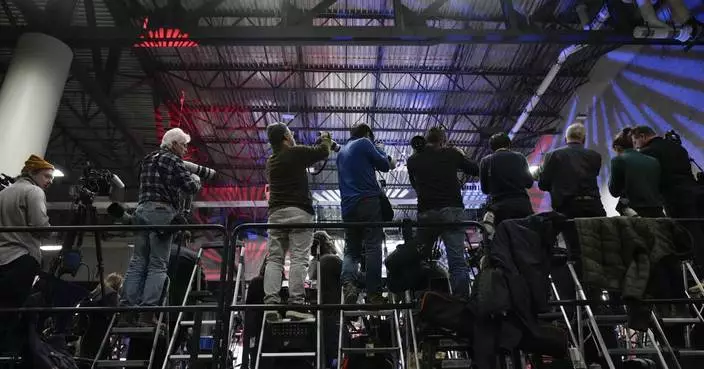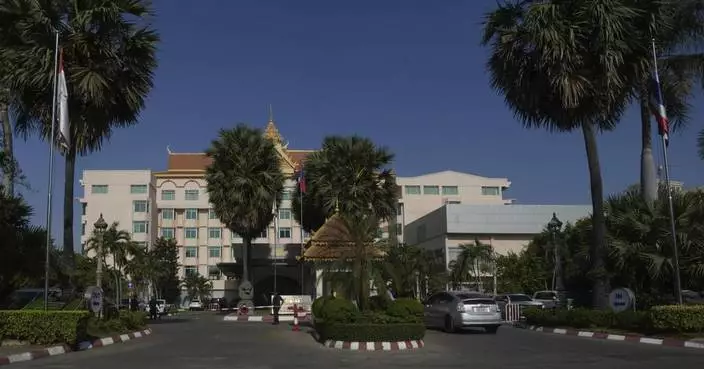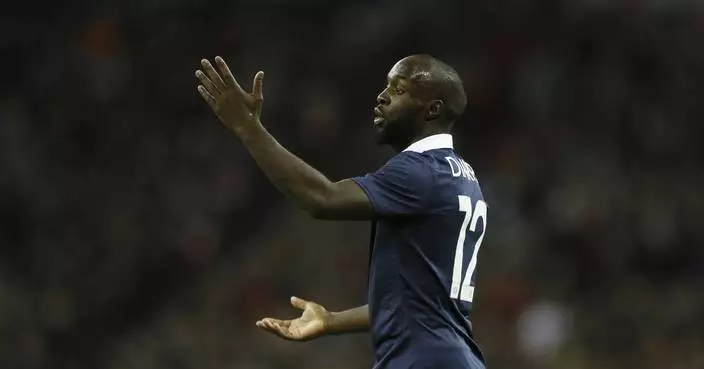With Boris Johnson confirmed as the next leader of the Conservative Party and British prime minister, the outlook for the British economy has certainly become murkier — and potentially more perilous.
Johnson's comprehensive victory over Jeremy Hunt has made it more likely that Britain could leave the European Union on Halloween without a withdrawal agreement, a prospect that even the most ardent Brexit believers concede would be disruptive in the short-term before any benefits start to manifest.
Most economists think a so-called "no-deal" Brexit will be a lot worse than that.
A deep recession is widely predicted for that scenario. Whether it would be as deep as the one that followed the global financial crisis — more than 6% — no-one knows, but almost all economists agree that jobs will be lost and that public finances will get stretched.
A "no-deal" Brexit effectively means that on Nov. 1, tariffs will be slapped on traded goods between the U.K. and the remaining 27 EU countries. Other impediments to trade, including on Britain's crucial financial services sector, will have to be imposed, such as new restrictions on the movement of people, customs and regulatory standards. Britain would also face the prospect of losing the trade deals the EU has struck over the years, including recent ones with Canada, South Korea and Japan — these account for around 11% of U.K. trade.
Richard Branson, the Virgin Group founder whose career has taken him from owning a record label to planning flights to space, thinks it will be a disaster — so much so that the pound will slump in value to be worth just a dollar for the first time ever. The pound has borne the brunt of Brexit uncertainty, falling more than 10% from $1.50 on the day after the June 2016 referendum. It's near two-year lows at $1.2450 as the "no-deal" talk escalates.
Though both sides of the English Channel will suffer in a "no-deal" scenario, Britain would suffer relatively more given that British exports to the EU account for around 13% of the country's annual GDP, versus 2.5% of the EU's.
Planning for a "no-deal" Brexit, which Johnson is expected to accelerate in his first days in 10 Downing Street, will help marginally.
Measures such as stockpiling medicines, sourcing more products from outside the EU or modifying road links in southeast England around the port of Dover to manage freight traffic can help, but only up to a point.
"Planning is unlikely to do much to mitigate the short-term disruption of 'no deal'," said John Springford, deputy director at the Centre for European Reform.
For one, he said, there is "too little time to build new border and road infrastructure to reduce congestion at the Dover-Calais crossing and on the M20 motorway in Kent." That raises the stakes for companies like the operator of the Channel Tunnel, which said Tuesday that a "no-deal" Brexit was now the main scenario in its earnings forecasts.
In his pitch to become prime minister, Johnson said he wants a deal but that he would make sure Britain leaves the bloc on Oct. 31, the revised Brexit date after the initial March 29 deadline was extended following the British Parliament's rejection of Theresa May's withdrawal agreement. That dealt with citizens' rights, Britain's financial obligations to the EU following 46 years of membership and making sure no hard border emerges between EU member Ireland and Northern Ireland, which is part of the U.K. The EU has said a deal is a pre-requisite before discussions can commence on a wide-ranging trade pact.
With parliament seemingly opposed to "no-deal," many Brexiters have promoted the idea that Johnson suspend parliament so Brexit just happens. The implications of such a move would be unpredictable. It could lead to civil unrest and a surge in Scottish nationalism, in addition to the instant economic hit. Johnson has said he doesn't want to go down that path but hasn't ruled it out.
Given these uncertainties, business executives are unsure how to plan and have reined in investment over the past two years. That's one of the main reasons why Britain's economy has stuttered and talk of a recession has grown.
"With economic growth already faltering, a disorderly 'no-deal' Brexit could cause widespread disruption to trade, a sharply lower exchange rate, higher inflation and lower living standards," said Arno Hantzsche and Garry Young of the National Institute of Economic and Social Research.
Most forecasters concur with that analysis so it would be a big step for Johnson to back such a move, without a mandate — in the Brexit referendum of June 2016, talk of a "no-deal" Brexit was confined to the periphery of the Leave campaign.
Johnson could therefore push for a general election in the fall after what many expect to be a failed attempt at renegotiating May's withdrawal agreement. With opinion polls showing Britain's electorate split across multiple parties, all bets are off on the outcome and whether any incoming government backs another referendum to reverse the initial result.
Johnson could equally opt to ditch his "do-or-die" pledge with regard to an Oct. 31 Brexit and seek another extension, giving him time to put a crowd-pleasing tax-cutting budget in place for an election next year.
Whatever happens — and given this is Brexit, anything can and probably will — the British economy is set to remain stuck in the mud for months to come.
Whether it sinks will hinge on the decisions Johnson makes in his first weeks in power.
Follow AP's full coverage of Brexit at: https://www.apnews.com/Brexit
BEIRUT (AP) — The European Union announced Thursday an aid package for Lebanon of 1 billion euros — about $1.06 billion — that will mostly go to boost border control to halt the flow of asylum seekers and migrants from the small, crisis-wracked country across the Mediterranean Sea to Cyprus and Italy.
The deal follows other EU aid packages for countries such as Egypt, Tunisia and Mauritania to fortify their borders. It comes against a backdrop of increasing hostility toward Syrian refugees in Lebanon and a major surge in irregular migration of Syrian refugees from Lebanon to Cyprus.
European Union Commission President Ursula von der Leyen said during a Beirut visit with Cypriot President Nikos Christodoulides that the aid distribution will start this year and last till 2027.
The bulk of the aid — 736 million euros — would go to support Syrian refugees “and other vulnerable groups” in Lebanon, while 200 million euros are meant to bolster Lebanese security services in enforcing border and migration control, according to figures provided by the Cypriot government.
An unspecified amount would go to Lebanese fishermen, to discourage them from selling their boats to smugglers.
Von der Leyen said the EU will also work on a “more structured approach to voluntary return" of Syrian refugees "in close cooperation with” the U.N. refugee agency. The bloc will continue to maintain “legal pathways” for resettlement of refugees in Europe, she said.
Lebanon's Caretaker Prime Minister Najib Mikati praised the package, saying that “Lebanon’s security is security for European countries and vice versa,” and that an escalation of the crisis ”will not be limited to Lebanon but will extend to Europe."
Lebanon, which has been in the throes of a severe financial crisis since 2019, hosts nearly 780,000 registered Syrian refugees and hundreds of thousands more who are unregistered, the world's highest refugee population per capita.
Lebanese political officials have for years urged the international community to resettle the refugees in other countries or assist their return to Syria — voluntarily or not. Lebanese security forces have stepped up deportations of Syrians over the past year.
Tensions further flared after an official with the Christian nationalist Lebanese Forces party, Pascal Suleiman, was killed last month in what military officials said was a botched carjacking by a Syrian gang. The incident prompted outbreaks of anti-Syrian violence by vigilante groups.
Meanwhile, Cypriot authorities complain the island nation has been overwhelmed by irregular migration of Syrian asylum seekers, many of them coming on boats from Lebanon.
The UNHCR in Lebanon said it had verified 59 “actual or attempted” departures by boats carrying a total of 3,191 passengers from Lebanon between January and mid-April, compared to three documented boat movements carrying 54 passengers in the same period last year. Usually, few boats attempt the much more dangerous crossing in the winter. In all of 2023, UNHCR recorded 65 boat departures carrying 3,927 passengers.
Cyprus has taken a new approach to halting the flow of migrants. Last month, it suspended processing of Syrian asylum applications, and human rights groups accused the Cypriot coast guard of forcibly turning back five boats carrying about 500 asylum seekers coming from Lebanon. Cypriot officials have denied this.
Bassel al-Shayoukh, a Syrian refugee from Idlib living in Lebanon since 2014, said his brother and several cousins and nephews were on one of the boats turned back. Now he wants to make the journey himself.
“In the beginning I thought that in a year or two the war would be over in Syria,” he said, but it dragged on, while in Lebanon “every year ... the situation began to get worse.”
Shayoukh said he fears being beaten by vigilantes or deported to Syria after Lebanese authorities declined to renew his residency permit.
His 17-year-old nephew, who declined to give his name fearing for his safety, said the Cypriot coast guard started making waves to push the boat he was on away. “I was terrified... I don’t know how to swim,” he said. “I thought we were going to die.”
The people on the boats “stayed three days without food or water” before turning back to Lebanon, the teen added.
Back in Lebanon, they were detained by the army; those registered with UNHCR were released and the others deported.
Mohammed Sablouh, a Lebanese human rights lawyer who works on refugee and migrant cases, says Lebanese authorities are deliberately “turning a blind eye" to the surge in migration to "pressure the international community.”
The Lebanese army did not respond to a request for comment on their measures to combat smuggling.
Thursday's aid announcement comes ahead of the annual fundraising conference for Syria in Brussels later this month. After 13 years of civil war, donor fatigue has set in while the world’s attention is occupied by the humanitarian fallout of more recent conflicts in Ukraine and Gaza.
The Cypriot president said Thursday was a “historic day” and called for European officials to go farther and declare some areas of Syria safe for return.
“The current situation is not sustainable for Lebanon. It is not sustainable for Cyprus, it is not sustainable for the European Union,” Christodoulides said.
But not all Lebanese officials are convinced the European aid would solve the problem.
Lebanese Forces party head Samir Geagea told The Associated Press earlier this week that European authorities are mainly concerned “that the refugees don’t go to Europe."
"For us the problem is that we cannot have our country drowning in illegal Syrian refugees,” Geagea said, urging for Syrians to be sent back to either government or opposition-held areas of the neighboring country.
But Shayoukh says he has nowhere to go.
The Damascus government wants him for opposing Syrian President Bashar Assad, he said, while the Islamist group that now controls his hometown behaves "the same way as the regime’s intelligence services” in crushing dissidents.
Associated Press writer Menelaos Hadjicostis in Nicosia, Cyprus, contributed to this report.
Follow AP’s global migration coverage at: https://apnews.com/hub/migration

Lebanese caretaker Prime Minister Najib Mikati, center, speaks during his meeting with Cyprus' President Nikos Christodoulides, left, and President of the European Commission Ursula von der Leyen at the government palace in Beirut, Lebanon, Thursday, May 2, 2024. (AP Photo/Hassan Ammar)
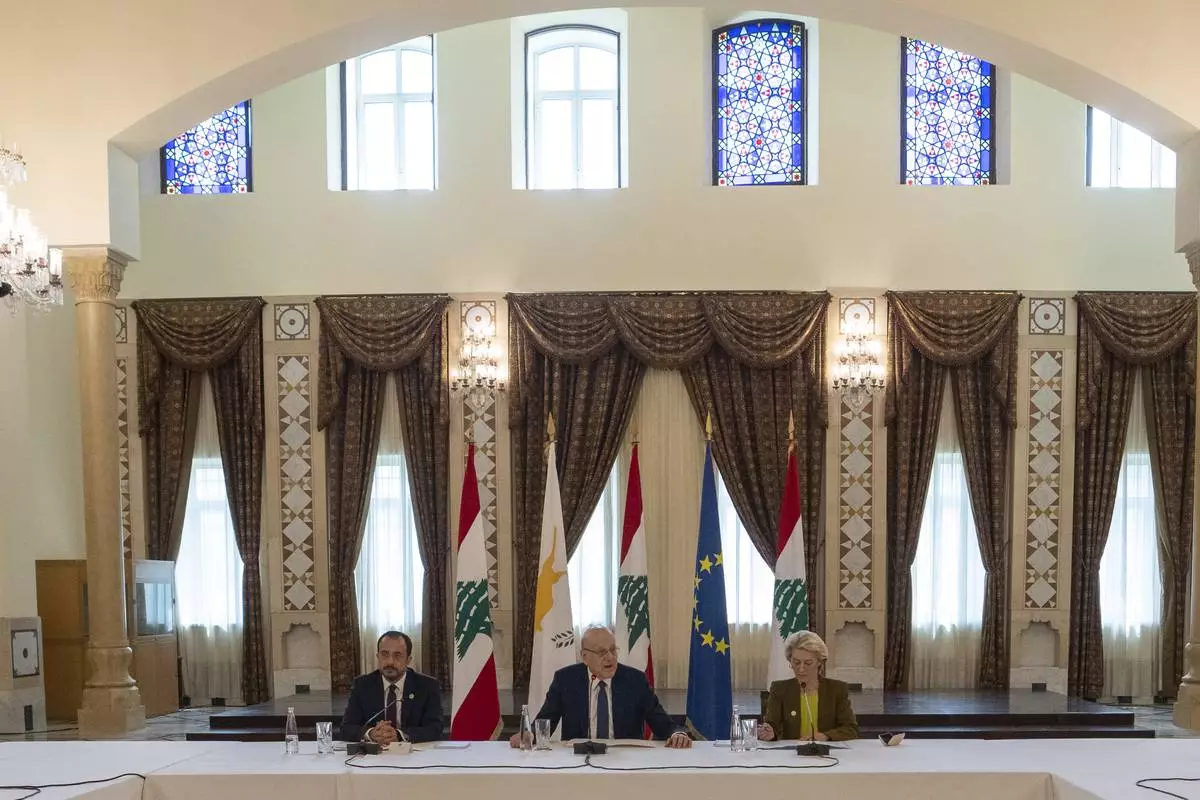
Lebanese caretaker Prime Minister Najib Mikati, center, speaks during his meeting with Cyprus' President Nikos Christodoulides, left, and President of the European Commission Ursula von der Leyen at the government palace in Beirut, Lebanon, Thursday, May 2, 2024. (AP Photo/Hassan Ammar)

Lebanese caretaker Prime Minister Najib Mikati, center, welcomes Cyprus' president Nikos Christodoulides, left, and President of the European Commission Ursula von der Leyen before their meeting at the government palace in Beirut, Lebanon, Thursday, May 2, 2024. (AP Photo/Hassan Ammar)
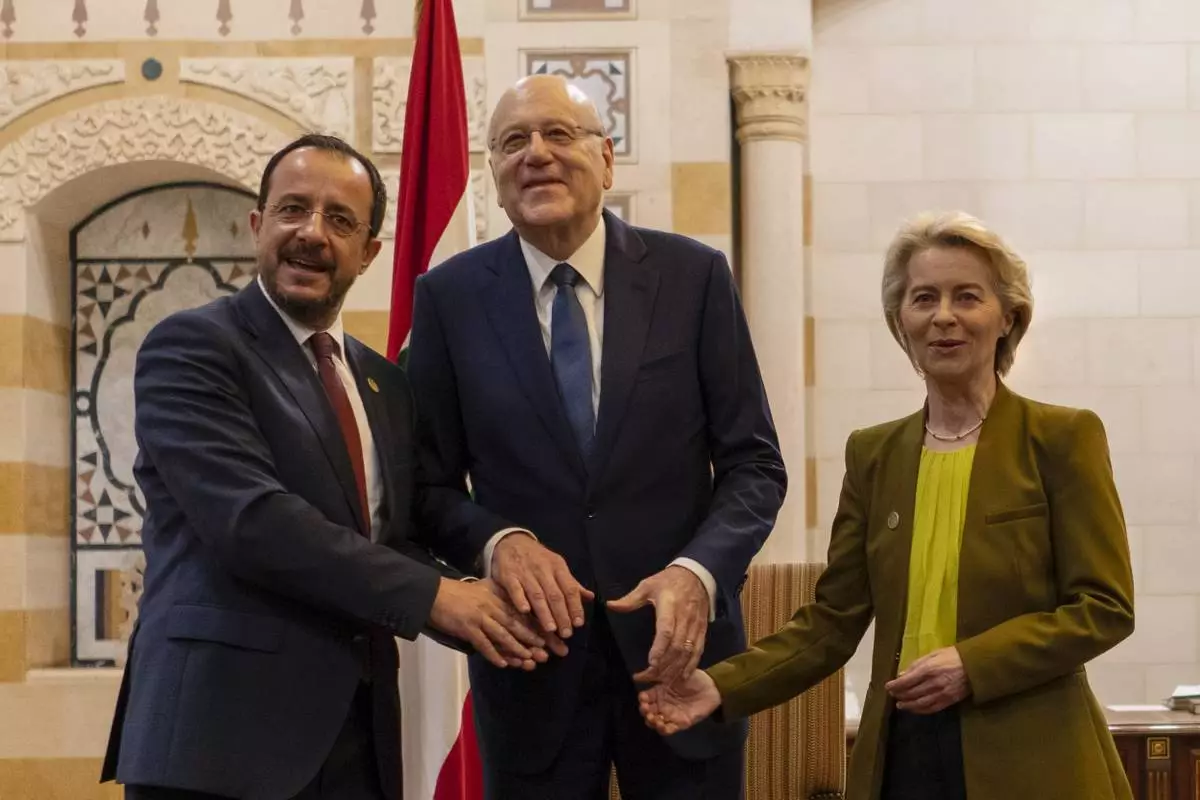
Lebanese caretaker Prime Minister Najib Mikati, center, Cyprus' President Nikos Christodoulides, left, and President of the European Commission Ursula von der Leyen pose for photograph at the government palace in Beirut, Lebanon, Thursday, May 2, 2024. (AP Photo/Hassan Ammar)

Lebanese caretaker Prime Minister Najib Mikati, right, welcomes Cyprus' president Nikos Christodoulides before their meeting at the government palace in Beirut, Lebanon, Thursday, May 2, 2024. (AP Photo/Hassan Ammar)

Cyprus' President Nikos Christodoulides, left, and President of the European Commission Ursula von der Leyen, center, review an honor guard upon their arrival to meet with the Lebanese Speaker Nabih Berri, in Beirut, Thursday, May 2, 2024. (AP Photo/Hussein Malla)

Lebanese caretaker Prime Minister Najib Mikati, center, speaks during his meeting with Cyprus' President Nikos Christodoulides, left, and President of the European Commission Ursula von der Leyen at the government palace in Beirut, Lebanon, Thursday, May 2, 2024. (AP Photo/Hassan Ammar)
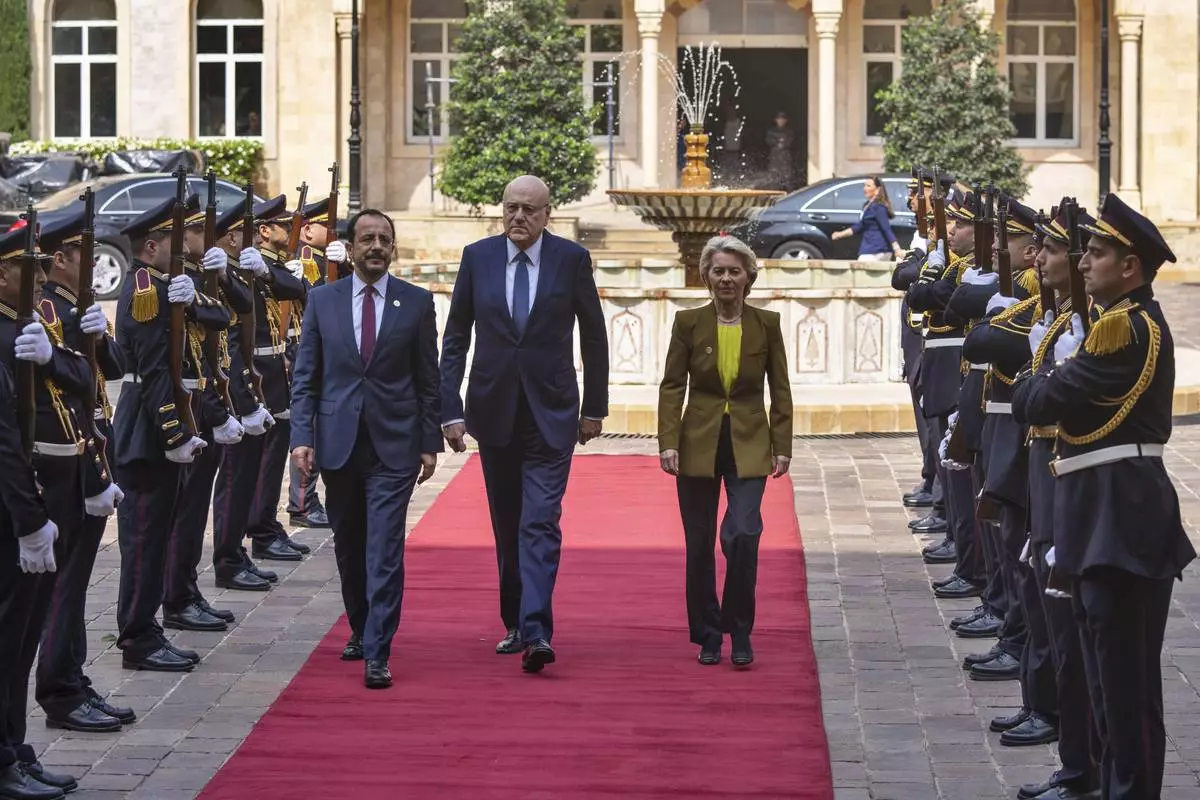
Lebanese caretaker Prime Minister Najib Mikati, center, welcomes Cyprus' President Nikos Christodoulides, left, and President of the European Commission Ursula von der Leyen at the government palace in Beirut, Lebanon, Thursday, May 2, 2024. (AP Photo/Hassan Ammar)











